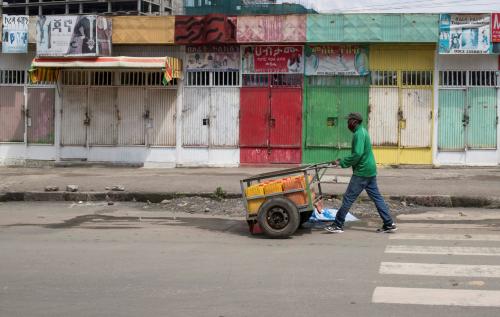The Dodd-Frank Wall Street Reform and Consumer Protection Act is the very well known piece of legislation that intends to regulate the U.S. financial market. The debate over the act and its implementation continues and I have contributed to that discussion in other postings.
Yet, what is not so well known is how the Dodd-Frank Act extends beyond Wall Street and even the rest of the United States. There are two provisions in it that are intended to promote transparency and governance in natural resources in countries outside the United States.
Section 1504 is the more general provision on transparency. It mandates oil, gas and mining companies registered with the Securities and Exchange Commission (SEC) to publicly disclose the tax and revenue payments made to any government.
The more specific Section 1502 requires that companies that use minerals from the Democratic Republic of Congo and adjoining countries disclose whether such minerals are sourced from areas in conflict within that region, so to provide information as to whether the payments made by such companies may be funding armed groups in those areas.
While few would publicly argue against promoting transparency generally, it is no secret that these provisions have generated much discussion and controversy. This matters for how the provisions will be implemented in practice. Thus, it is important to seriously debate all sides of the issues surrounding these two provisions, including the criticisms leveled against them.
For instance, it is important to discuss whether Section 1504 — which mandates transparency requirements in oil, gas and mining-related payments to governments — does not impose new and enormous (multi-billion) costs of compliance, which may create a major competitive disadvantage on companies. Further, do project payment disclosures really mean revealing trade secrets? If there are costs, how do they stack up against the benefits from transparency and disclosure in natural resources? And on the other hand, what are the benefits to transparency? How can greater transparency help improve the management of natural resources in a way that contributes to economic development and increase accountability?
As indicated, Section 1502 is aimed at cutting off financing to armed groups who have profited from trade in minerals and use this money to finance their operations. The issues of compliance costs and competitive disadvantage are also concerns for some parties with regard to this section on conflict minerals. There are also additional questions that merit debate, such as assessing the potential benefits from denying armed groups from being financed by companies purchasing minerals and the reduction in violence and human rights abuses, versus the potential for disruption in trade on minerals from the DRC and adjoining countries. This may inflict undue “collateral damage” on some mineral-extracting areas that are not conflict-ridden. On the other hand, these costs should be weighed against the costs of continued trade in conflict minerals. How high are these costs? And what are some benefits for companies and the DRC in developing a clean minerals trade?
These and many other relevant and related issues will be debated in a public event this coming Tuesday, December 13 at the National Press Club in Washington, D.C. We at Global Economy and Development at Brookings along with Global Witness will host a discussion to examine these two provisions in the Dodd-Frank Act.
Leading experts from civil society in the United States and Africa, the private sector, the financial sector and think tanks will participate in an interactive panel setting to review the priority issues surrounding each provision. Representative Jim McDermott (D-Wash.), will provide the opening remarks while Senator Ben Cardin (D-Md.) will give the closing remarks. And Reverend Jim Wallis of Sojourners will also be speaking during the lunch break. The panels will provide ample room for debate among the panelists and between the panelists and the audience, aiming at bringing out the key issues from all sides.
Given the importance of these initiatives and the ongoing discussions on their implementation details, we expect a lively debate.



Commentary
Transparency in Natural Resources and Conflict Minerals: What We May Not Know About Dodd-Frank
December 9, 2011